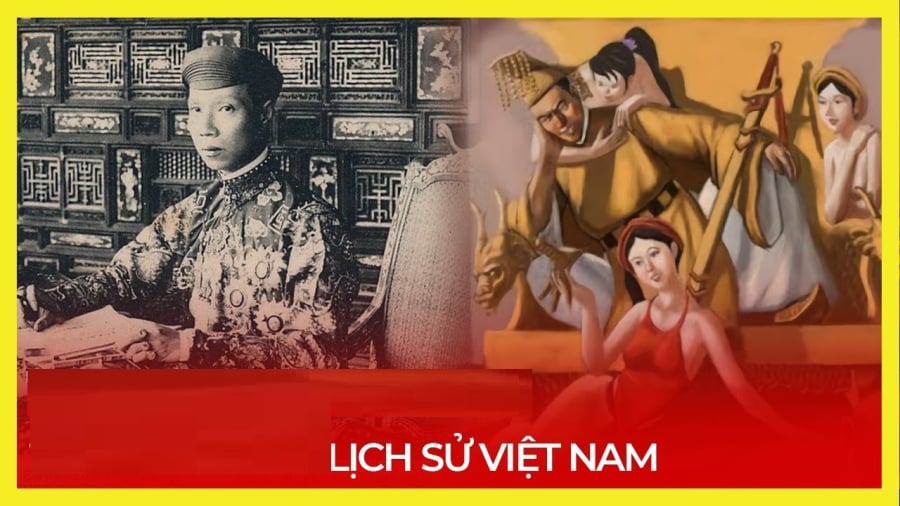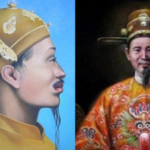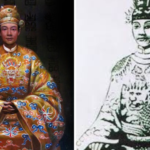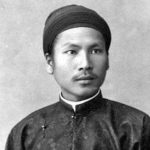Throughout the feudal history of Vietnam, King Tu Duc is recorded as having the most wives. His real name is Nguyen Phuc Thi, self-proclaimed Hong Nham, born on August 25, 1829. Tu Duc is the son of King Thieu Tri and his honorable queen Pham Thi Hang (Tu Du Empress). When Tu Duc was 19 years old, King Thieu Tri passed away due to a serious illness, and Tu Duc succeeded the throne from that point on.
Tu Duc – a filial king with no children
In the Nguyen dynasty, Tu Duc was the longest-reigning king for 36 years (1847-1883). He had a total of 103 wives but did not have any biological children. The reason is that from a young age, Tu Duc suffered from smallpox and chronic illness, resulting in poor health.

Historical records state that King Tu Duc became infertile due to complications from smallpox. For the feudal era, not having an heir was abhorrent and considered one of the three major offenses. Tu Duc acknowledged three grandchildren as adopted heirs: Ung Chan, Ung Duong, and Ung Dang. Among them, Ung Chan later succeeded the throne and became known as King Duc Duc.
Queen Tu Du, although living in seclusion, was very attentive and took care of the people’s lives. Despite being in the palace, she was well-informed about many outside affairs. It was Queen Tu Du who advised her son to consider reducing taxes for the people during years of crop failure and famine. Luckily, with a filial son, her valuable advice was quickly implemented by Tu Duc, bringing a good reputation to the dynasty.
Although Tu Duc faithfully served his mother, he himself fell into history as a self-proclaimed king. This was also his greatest sorrow because, according to the Confucian belief, “The three unfilial acts and no child is the heaviest.” Throughout his 36-year reign, Tu Duc did not have any biological children with his queen, Le Thien Anh (who was posthumously titled Empress).
With his other concubines, Tu Duc also failed to have a successor. The reason was that the king suffered from smallpox since childhood, which made it impossible for him to have children. Thus, this filial king accepted three grandchildren as adopted heirs to preserve the lineage: Nguyen Phuc Ung Ai (later became King Duc Duc), Nguyen Phuc Ung Ky (later became King Dong Khanh), and Nguyen Phuc Ung Dang (later became King Kien Phuc).
King Tu Duc was famous for marrying many wives. Knowing that it was difficult for him to have children, he tried every possible means to find a cure. He used various secret and rare traditional remedies from both within and outside the country. There is even a legend that Tu Duc kidnapped a married woman in the hope of having a child. He visited sacred temples, changed the names of temples in Hue to avoid using the character “Thien” out of fear of breaking Heaven’s taboo. Thus, the Thiên Mụ Pagoda was renamed Linh Mụ Pagoda, Thiên Ấn became Từ Ân… Unfortunately, despite his efforts, Tu Duc still could not have children.
Tu Duc – a highly talented poet, but poor in academic exams
Tu Duc was recognized as the most knowledgeable king in the Nguyen dynasty. He highly valued education, scholarly exams, and established various competitions to select talented literary individuals for governmental positions.
Tu Duc was a studious person with vast knowledge and a special affinity for poetry. Every night, he would read books until late. He composed many poems in classical Chinese, including the series of “Nhữ Chế Việt sử tổng vịnh” which praised hundreds of personalities in Vietnamese history. In addition, he wrote books in Nôm script to facilitate understanding for the people, such as “Luận Ngữ diễn ca”, “Thập điều”, “Tự học diễn ca”… Tu Duc also had a refined indulgence for writing letters and engaging in poetic competitions with contemporary poets and scholars.
Tu Duc was also a king fond of history and politics; he himself often provided comments in the extensive history book “Khâm Định Việt Sử Thông Giám Cương Mục,” covering from ancient times to the end of the Later Le dynasty. The king was also deeply engaged in the art field, directing contemporary artists to produce larger-scale theatrical works like “Vạn bửu trình tường” and “Quần phương hiến thụy.” He also had a great interest in architectural art, researching and applying it extensively. The most notable example was the royal tomb complex. The king “defined” the architectural model, covering an area of about 12 hectares, with nearly 50 large and small architectural structures spread out in a unified and harmonious manner, interconnected with stone steps and paths made of Bat Trang bricks, creating a close and intimate composition.
However, alongside all the descriptions of his extraordinary talents, there is a little anecdote that shows a different evaluation of his literary talent from the ordinary. The king himself often boasted: “I don’t participate in exams, but if I do, I will definitely pass the Trang Nguyen exam.”
Seeing that no one seemed to agree with him, Tu Duc came up with an idea. He, along with some high-ranking officials, wrote an essay and deliberately sent it to the Qing Dynasty, requesting them to establish an examination board to score it. Tu Duc was confident that no matter what, he would be among the top scorers. However, it turned out that Tu Duc’s essay ranked last; there was a comment in his paper saying, “This essay shows that the author is a knowledgeable and dignified person, not an ordinary individual, but lacks talent!”
In fact, this story is just a humorous addition to the vivid picture of the talented king. Tu Duc’s talent was recognized and respected by his contemporaries and future generations.

King Tu Duc was one of the last kings of the Nguyen dynasty, a period when the feudal regime in Vietnam gradually declined. At that time, the country was named Dai Nam, meaning a vast nation in the South. Under Tu Duc’s reign, the Nguyen dynasty’s military weakened, the economy stagnated, and numerous uprisings occurred. Although proficient in literature and meticulous in state affairs, he had a conservative mindset and lacked long-term vision.
On September 1, 1858, the French-Spanish coalition fired the first shot on the Son Tra Peninsula – Da Nang, initiating the invasion of Vietnam. The Nguyen court was helpless against the French invasion and only considered cutting pieces of land to negotiate peace. In 1883, after Tu Duc passed away, the French forces entered the capital and forced the Nguyen court to acknowledge their “protection” over the entire Vietnamese territory. Thus, starting from the era of Tu Duc, the Nguyen kings only kept their titles in name, serving as a mere compensation.
Examining the Long-Term Impact of the 7th May 1954 Dien Bien Phu Victory
As we mark the 66th anniversary of the victorious battle at Dien Bien Phu on May 7, 1954, it is important to reflect on the monumental impact this event had on the world. Let us take a closer look into the historic significance of this momentous occasion in the Vietnamese people’s struggle for independence.





























 Queen
Queen




